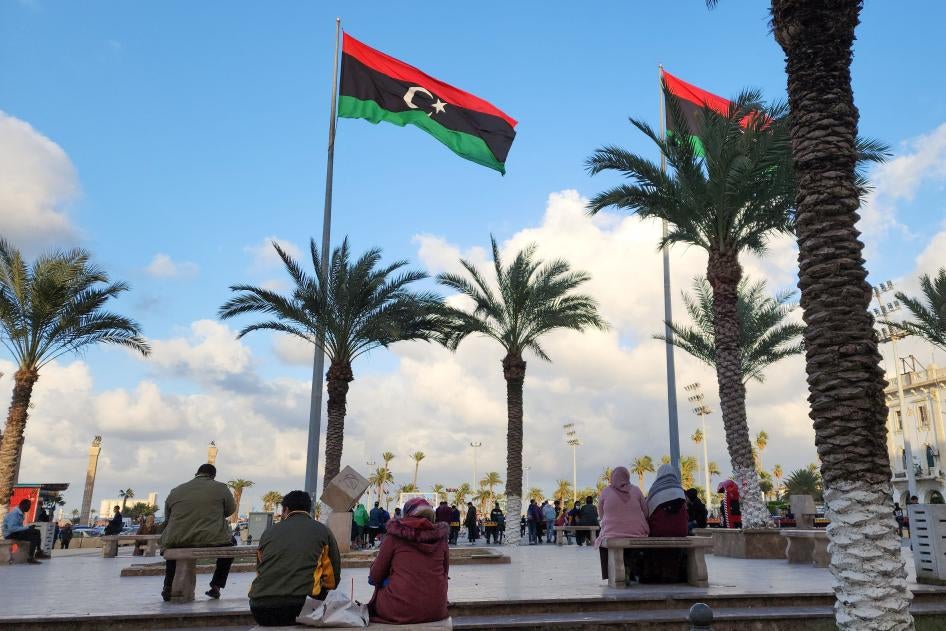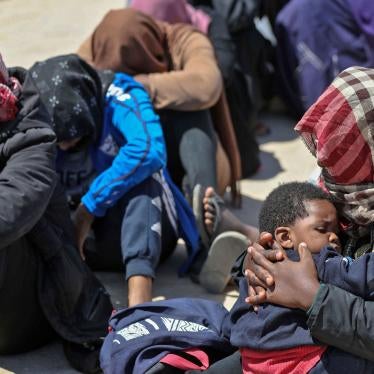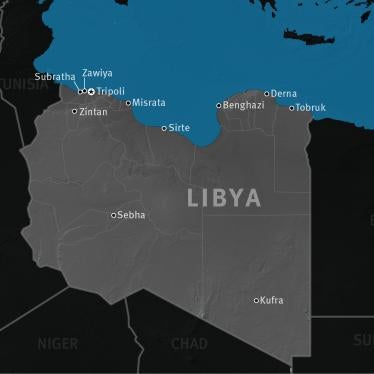(Beirut) – Libya’s Government of National Unity (GNU) and other authorities are cracking down on nongovernmental domestic and foreign organizations, Human Rights Watch said today. The GNU should withdraw onerous registration and administration requirements and ensure that civic groups are free to operate.
In a March 21, 2023 circular, the Office of the Prime Minister of the Tripoli-based GNU said that domestic and foreign nongovernmental organizations could continue operating only if they “correct their legal status” in line with a draconian 2001 Muammar Gaddafi-era law. This statement came after months of increasing restrictions on civic group activities, including harassment and at times detention and prosecution of local staff members and obstacles for non-Libyans working in humanitarian, human rights, and other nongovernmental organizations to obtain entry visas.
“Libyan authorities are crushing civic space using the tired pretext of enforcing regulations,” said Hanan Salah, associate Middle East and North Africa director at Human Rights Watch. “The authorities should instead be protecting that space by upholding the right to freedom of association.”
On March 8, the Law Department of the Supreme Judicial Council, which oversees judicial affairs and the legal profession, issued an edict in response to a request by the Tripoli Commission of Civil Society declaring, “illegal all civil associations and civil society organizations not established based on the provisions of Law 19/2001 on Nongovernmental Organizations.” The edict also specified that civic groups established under any other regulations were “null and void.”
In response, on March 13, the GNU issued a circular ordering all government institutions to uphold it until further notice. On March 21, the GNU retracted this statement and gave nongovernmental organizations provisional legal standing until they “correct their legal status,” without providing a clear timeline.
The Gaddafi-era Law 19/2001 on the Reorganization of Nongovernmental Organizations greatly restricts civil society work, permitting registration only for groups with a mandate to work on social, cultural, sports-oriented, charitable or humanitarian issues, but not other issues including human rights. The government did not clarify how such organizations can legally operate.
Law 19/2001 also has overly burdensome registration requirements and empowers authorities to intervene in associations’ leadership and dissolve organizations without a court order. The group Frontline Defenders reported in 2015 that only 22 organizations were registered under the law.
Some Libyan legal experts contend that Law 19/2001 was effectively suspended with the adoption of the Libyan Constituent Covenant by the National Transitional Council in 2011, which guarantees freedom of association, speech, and assembly. However, legislators have yet to revoke the Penal Code provisions for severe punishments, including the death penalty, for the establishment of “unlawful” associations, which have been in place since the Gaddafi era.
For years, Libyan authorities and various armed groups around the country have restricted the ability of nongovernmental groups and their staff members to operate, Human Rights Watch said. The United Nations Independent Fact-Finding Mission on Libya in its March report found, “[a]ttacks against ... human rights defenders, women’s rights activists, journalists and civil society associations have created an atmosphere of fear that has sent persons into self-censorship, hiding or exile.”
The Fact-Finding Mission also highlighted the three-year prison sentence with hard labor handed down in December 2022 in Tripoli on four members of the Tanweer Movement, a grassroots organization that promoted culture and arts activities, on charges of “atheism, agnosticism, being feminist and infidels.”
The four were among a group of nine men whom the Tripoli Internal Security Agency, an armed group, arrested between November 2021 and March 2022, on a range of accusations including atheism and anti-Islam sentiments. Videotaped “confessions” by some of them, apparently obtained under duress, appeared on social media. At least three of the four men sentenced are in prison, while the other five remain in pre-trial detention.
In March 2022, Tanweer members who had fled abroad dissolved the organization and canceled the group’s social media presence. In a final statement, they decried the crackdown and called for their colleagues’ release.
The imprisonment of Tanweer members, using religion as a pretext, will deter Libyan youth from engaging in civil society activities, Human Rights Watch said.
Since late 2022, the authorities have also greatly limited entry visas for non-Libyan staff of humanitarian agencies and nongovernment organizations, including Human Rights Watch and other rights groups. UN officials have said the measures also affected agencies linked with the UN.
The UN special rapporteur on violence against women and girls, Reem Alsalem, who visited Libya in December, said in a statement that she had encountered many obstacles, including a lack of access to detention centers holding women and girls. The Libyan Arab Armed Forces (LAAF), the armed group under the command of Khalifa Hiftar that effectively controls eastern Libya, barred her from leaving the airport in Benghazi for visits and meetings that she had planned there.
Alsalem is only the second UN expert to visit Libya since 2011, following a visit in 2018 by the UN special rapporteur on the human rights of internally displaced persons. Visit requests from at least nine other experts, including the special rapporteurs on torture, trafficking, migrants, and slavery, are pending.
The Fact-Finding Mission said the GNU authorities did not give them access to detention facilities anywhere in Libya during their two-year mandate. Neither the GNU nor the LAAF allowed them access to Libya’s southern region, which the LAAF largely controls.
Withholding entry visas for aid organization staff could impair delivery of aid to vulnerable populations. Several members of nongovernmental organizations told Human Rights Watch that their foreign employees had been unable to obtain entry visas since the end of 2022. These included international humanitarian and human rights organizations, and implementing partners of the UN in Libya.
Human Rights Watch has received no response from GNU authorities to its applications for entry visas since October 2022.
A slew of vaguely worded laws governing expression, assembly, association, cybercrime, and crimes against the state severely restricts nongovernmental organizations in Libya. The Commission of Civil Society, a Tripoli-based body tasked with registering and approving civic organizations and their activities, has sweeping powers to inspect documents, control funding, and cancel the registration and work permits of domestic and foreign organizations. A second Benghazi-based body with similar functions reports to the Government of National Stability (GNS).
The Tripoli-based GNU, which was nominated by delegates of the Libya Political Dialogue Forum in March 2021 after UN-facilitated political talks, and the rival eastern and Sirte-based GNS, nominated by the House of Representatives in March 2022 and allied with the LAAF, vie for national political legitimacy and control in Libya.
Libyan legislators and authorities should ensure the following as a matter of priority:
- Adopt a civil society organization law that guarantees the right to freedom of association and expression consistent with international law and best practices;
- Reform Penal Code articles that undermine freedom of association and assembly, redefining criminal acts to exclude peaceful exercise of the right to express opinions, assemble, and establish associations;
- Release detained Tanweer members and anyone else held for the peaceful exercise of their basic rights;
- Repeal the death penalty as a punishment for establishing or participating in unlawful organizations;
- Allow for the free establishment of associations without restriction on what they advocate or promote, with the exception of acts of violence, incitement to imminent violence, or other serious crimes;
Ensure that any suspension or dissolution of a nongovernmental organization takes place only by judicial order and in response to serious violations of national law that result in a clear and imminent danger, are strictly proportional to the legitimate aim pursued, and used only when other measures would be insufficient.









